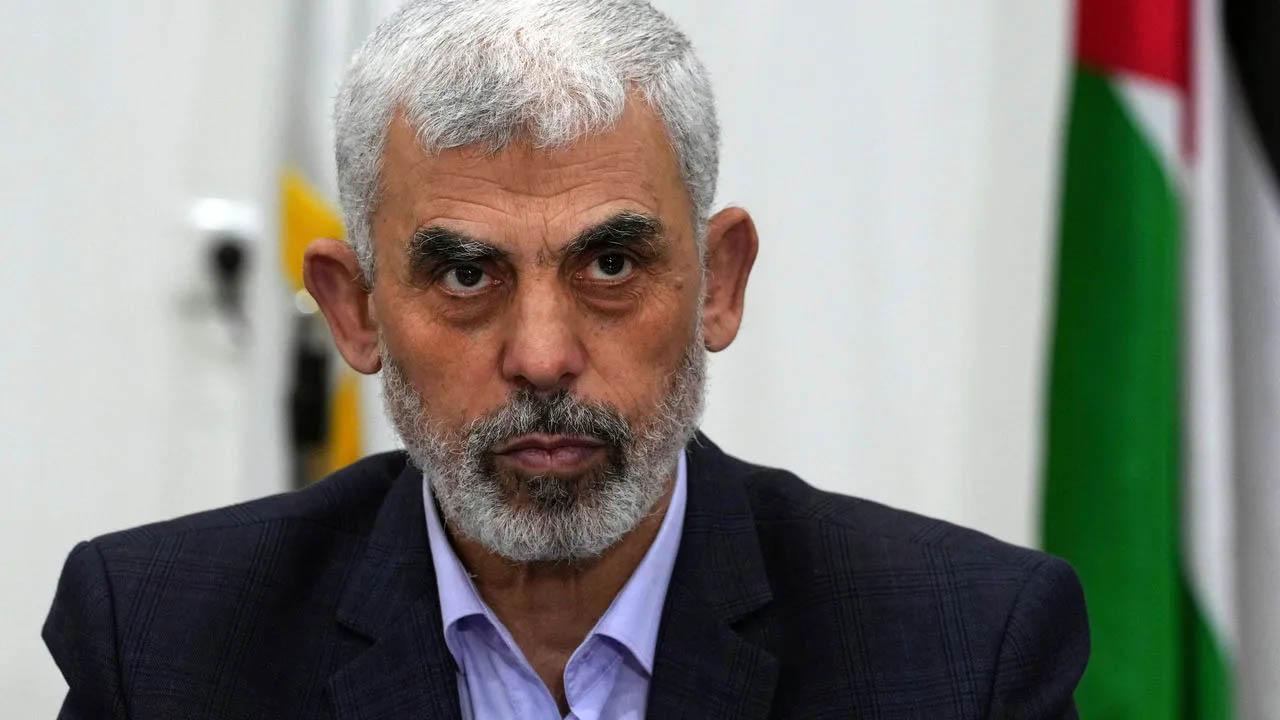International
Hamas leader Yahya Sinwar feared killed in Israeli Gaza operation

Hamas leader Yahya Sinwar feared killed in Israeli Gaza operation
Yahya Sinwar, a senior leader within Hamas, is feared to have been killed during an Israeli military operation in Gaza, according to emerging reports.
Sinwar, who allegedly played a pivotal role in the October 7, 2023, attacks on Israel, is at the centre of an investigation by Israeli authorities, though confirmation of his death is still pending.
Sources cited by the BBC suggest that preliminary assessments point toward Sinwar, 61, being among those killed in recent strikes, but final verification has not been made.
Disturbing images circulating online depict a lifeless body resembling Sinwar amid the debris of a targeted building, showing visible injuries.
Sinwar gained prominence in Hamas after his release from an Israeli prison in 2011 as part of a widely publicized prisoner exchange. Known for his militant stance, he championed military actions over diplomatic negotiations with Israel.
For years, Israel has considered Sinwar one of its most wanted targets in Gaza. He is accused of orchestrating the deadly October 7 attacks that resulted in the deaths of more than 1,200 Israelis and the abduction of over 250 individuals into Gaza.
READ ALSO:
- JAMB makes U-turn, directs higher institutions to admit 16-year-old candidates
- Cement company, Lafarge, to face trial over subsidiary alleged funding terrorism
- Illegal CNG conversion caused Benin car explosion – PCNGi
Israel’s Defence Minister, Yoav Gallant, recently invoked a passage from the Torah, underscoring the nation’s determination to retaliate: “You will pursue your enemies, and they will fall before you by the sword.” Gallant emphasized Israel’s commitment to targeting those responsible for assaults on its people.
Anonymous officials quoted by Reuters revealed that the Israeli security cabinet has been briefed on the likelihood that Sinwar has been killed. Similarly, Channel 12 reported that government insiders believe Sinwar was neutralized during the ongoing offensive in Gaza.
An Israeli security source told AFP that DNA testing is underway to confirm whether the body recovered from the rubble belongs to Sinwar. His DNA and biometric data, obtained during his previous imprisonment in Israel, are being used for identification.
The strike reportedly occurred during an operation in Rafah, southern Gaza, where Israeli troops clashed with militants. The Israeli military announced that three fighters were killed in the encounter, with indications suggesting Sinwar may have been among them.
If verified, Sinwar’s death would represent a significant achievement for Israel, dealing a symbolic blow to Hamas amid the ongoing conflict. His leadership role in coordinating Hamas’ militant operations, including the recent attacks, has made him a prime target.
Hamas leader Yahya Sinwar feared killed in Israeli Gaza operation
International
15 Killed as Peruvian Military Helicopter Crashes During Flood Relief Mission

15 Killed as Peruvian Military Helicopter Crashes During Flood Relief Mission
At least 15 people, including seven children, were killed after a Peruvian Air Force Mi‑17 helicopter crashed on Sunday while carrying out a flood relief and rescue mission in the Arequipa region of southern Peru. The helicopter was part of a humanitarian assistance operation responding to severe flooding and landslides that have damaged homes, roads, and infrastructure across the region.
The Mi‑17 helicopter, carrying 11 passengers and four crew members, vanished from radar while flying from Pisco toward the coastal town of Chala Viejo in Caravelí Province. Loss of radio contact triggered an intensive search and rescue operation, involving Peruvian special forces, police units, and Air Force personnel, which located the wreckage on Monday.
Among the victims were seven minors aged between 3 and 17 years old. Adults confirmed dead include Colonel Javier Nole Gonzales, Air Force officer Sergio Danner Paucar Centurión, Elisa Bernal Paredes, Zoila Fernandez Medina, Luis Cárcamo, Kamila Jove, and Leiner Huamán, along with other passengers whose identities are being verified. All four crew members perished in the crash.
READ ALSO:
- Nigeria Allegedly Paid Boko Haram to Free Abducted Schoolchildren, Teachers – AFP Report
- Ijebu Ruling House Appeals to Tinubu to Resolve Awujale Stool Deadlock
- Human Rights Lawyer Says Amupitan’s INEC ‘Failed Woefully’ in FCT Election
The Peruvian Air Force (FAP) described the incident as a “tragic accident” and expressed its deepest condolences to the families of the victims. An Accident Investigation Board has been activated to determine the exact cause of the crash, including the possibility of mechanical failure, adverse weather conditions, or operational challenges.
This tragedy comes amid one of the most severe flood emergencies in Arequipa in recent years, with heavy rains causing rivers to overflow, landslides, and forced evacuations. The helicopter’s mission was intended to provide emergency relief, transportation of personnel, and logistical support to affected communities. Authorities warned that the loss of the aircraft and personnel may impact ongoing rescue operations.
Local officials and disaster response teams continue to assist flood-affected families, providing temporary shelters, food, and medical aid. Observers noted that the crash underscores the risks faced by rescue teams operating in disaster-prone regions and highlights the need for enhanced aviation safety measures in extreme weather conditions.
15 Killed as Peruvian Military Helicopter Crashes During Flood Relief Mission
International
Iran Threatens ‘Ferocious’ Retaliation as Trump Weighs Military Action

Iran Threatens ‘Ferocious’ Retaliation as Trump Weighs Military Action
Iran has warned that it would respond “ferociously” to any military attack by the United States, raising fears of a wider regional conflict as Donald Trump considers possible strikes amid renewed tensions over Tehran’s nuclear programme.
The warning was issued on Monday by Iran’s Foreign Ministry as Washington confirmed that indirect nuclear talks with Tehran would resume on Thursday in Geneva. The escalating rhetoric from both sides has coincided with heightened US military deployments in the Middle East and growing diplomatic anxiety across the region.
Trump said last week that he was weighing a limited military assault if Iran failed to reach an agreement within a narrow timeframe, warning that Tehran had at most 15 days to make a deal. Iran responded by stressing that any strike—regardless of scale—would be treated as an act of aggression.
“And any state would react to an act of aggression… ferociously. That is what we would do,” Iranian Foreign Ministry spokesman Esmaeil Baqaei said.
Iran has indicated it is preparing to submit a draft proposal on its nuclear programme to mediators in the coming days. The talks, being conducted indirectly through Oman, follow two previous rounds of negotiations held in Switzerland.
READ ALSO:
Tehran insists its nuclear activities are strictly for civilian purposes, including energy production and medical use. Western governments, however, believe Iran is seeking the capability to develop an atomic weapon, a claim Tehran has repeatedly denied.
Washington has also pushed to expand the talks to include Iran’s ballistic missile programme and its support for militant groups across the Middle East. Iran has rejected those demands, saying only the nuclear issue is open for negotiation.
Iranian Deputy Foreign Minister Kazem Gharibabadi described the resumption of talks as “a new window of opportunity,” but warned that any attack on Iran could trigger a crisis beyond its borders.
“The consequences of any renewed aggression would not remain confined to one country, and responsibility would rest with those who initiate or support such actions,” he said.
Tensions have also been rising domestically, with student protests in Iran resurfacing at the start of a new academic semester. Demonstrators have revived slogans from nationwide protests earlier this year, which were met with a deadly crackdown.
Growing fears of conflict have prompted several countries to issue travel and security advisories. India has urged its nationals to leave Iran, joining Sweden, Serbia, Poland and Australia, as concerns grow that a breakdown in diplomacy could spark a broader confrontation.
Despite the sharp rhetoric, diplomats say both sides remain engaged, with negotiations seen as the last viable option to avert a potentially devastating Iran-US military clash.
Iran Threatens ‘Ferocious’ Retaliation as Trump Weighs Military Action
International
US Adds 19 More Nigerians to ‘Worst of the Worst’ Deportation List

US Adds 19 More Nigerians to ‘Worst of the Worst’ Deportation List
The United States government has added 19 more Nigerian nationals to its “worst of the worst” criminal aliens list, bringing the total number of Nigerians scheduled for deportation to 113. The move targets convicted criminals who have served time in U.S. courts and are deemed a threat to public safety.
According to the U.S. Department of Homeland Security (DHS), the newly listed Nigerians were convicted of serious crimes, including sexual assault on a minor, fraud, assault, drug trafficking, and money laundering. These individuals were arrested by U.S. Immigration and Customs Enforcement (ICE) and will be deported after completing immigration procedures.
A DHS statement highlighted the purpose of the programme:
“The U.S. Department of Homeland Security is highlighting the worst of the worst criminal aliens arrested by U.S. Immigration and Customs Enforcement. Under Secretary Kristi Noem’s leadership, ICE is carrying out deportations — starting with the worst of the worst.”
READ ALSO:
- Gunmen Storm Gbugbu in Kwara, Residents Flee as Panic Spreads
- FG to Launch Monthly Revenue Transparency Dashboards to Improve Fiscal Accountability
- Troops Repel Coordinated Attacks in Borno, Kill 25 Terrorists, Soldier Dies
Among those newly added to the list are Adeolu Solabu, Oladayo Agboola, Chinonso Ochie, Oluchi Jennifer Chimdimma Chime, Samuel Omorodion, Sunday Adediora, Sunday Kunkushi, Mkpouto Etukudoh, as well as Marcus Unigwe, Kehinde James, Blessing Uchanma, Victor Adebisi, Richard Ugbah, Olaniyi Ojikutu, Oluwamuyiwa Olawoye, Okechukwu Amadi, Femi Jolayemi, Anthony Asanya, Izuchukwu Okoye, and Ebele Agbasiele.
This latest addition follows a previous announcement in which 79 Nigerian nationals had already been slated for deportation for offences ranging from fraud, manslaughter, assault, robbery, to drug-related crimes. The combined total of 113 Nigerians reflects the U.S. government’s intensified focus on criminal aliens.
The move has sparked renewed discussion about U.S. immigration enforcement, diplomatic engagement with Nigeria, and the rights and welfare of deportees. Advocates have raised concerns about ensuring due process and humane treatment for those returned to Nigeria, while authorities stress that deportation is a legal measure targeting foreign nationals convicted of serious crimes.
Globally, Nigerians have faced similar deportation measures, including large-scale removals from countries like India, where thousands were repatriated for visa violations or alleged criminal activities. The ongoing deportations underscore the challenges facing Nigerian citizens abroad amid tightened international immigration and law enforcement policies.
US Adds 19 More Nigerians to ‘Worst of the Worst’ Deportation List
-

 Business2 days ago
Business2 days agoDangote Opens Refinery Investment to Nigerians With Public Share Sale Plans
-

 Education3 days ago
Education3 days agoUTME: JAMB Clarifies Position on Hijab During Biometric Capture
-

 Politics2 days ago
Politics2 days agoTinubu Hails Wike as APC Dominates 2026 FCT Area Council Elections
-

 Entertainment2 days ago
Entertainment2 days agoRegina Daniels Takes Delivery of ₦150m 2026 GAC Trumpchi M8 SUV
-

 Politics3 days ago
Politics3 days agoADC Defeats APC to Win First Polling Unit in FCT Area Council Election
-

 Politics2 days ago
Politics2 days agoFCT Council polls: APC Wins Four Chairmanship Seats as PDP Takes Gwagwalada
-

 News2 days ago
News2 days agoYoruba Muslim Group Dismisses Viral Ramadan Date Claim, Reaffirms Sultan of Sokoto’s Authority
-

 Politics2 days ago
Politics2 days agoOpposition Weakens as Another Governor Eyes APC Move















